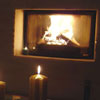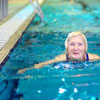The winter season can bring many health challenges for our in home care Elders if they are unprepared for it, particularly Elders with mobility issues or living with a form of dementia.
Carers of Elderly parents and Loved Ones should be well versed in adapting an Elder’s in home care and in making little lifestyle adjustments to keep them safe and healthy during these cold months. Daughterly Care’s mature Caregivers are trained and highly experienced in identifying and implementing the winter health measures because we believe good Elder health is paramount and part of our Joyful Living Approach™.
Ensure your Elderly Loved One’s good health and safety this winter…

TIP 1: Dress warmly
If you are venturing outside for appointments, a walk or a spot of gardening, you should layer up your clothes to stay warm. Two to three layers of clothing is more effective than one heavy layer. Consider investing in quality thermals. Every wardrobe should have a hat or beanie, gloves, scarf, socks, coat or jacket.
Remember: Hypothermia occurs when your body temperature drops to a dangerously low level. Elderly adults have an increased risk of hypothermia occurring due to physiological changes that occur with ageing.

TIP 2: Be aware of changes to outdoor surfaces
Many outdoor surfaces can become slippery during the winter months. This can be due to less daylight hours and the sun sitting lower in the sky so it doesn’t reach many shaded areas. Moss tends to develop on the ground in these areas and wet surfaces are slower to dry.
Be on the lookout for regularly wet, slippery areas like stairs and pathways. Wear appropriate footwear with non-skid soles. Check that the rubber base on canes and walkering frames are in optimal condition and replace the rubber if worn.

TIP 3: Heat the home safely
During the winter months we all tend to heat our home environments. Be aware that heaters and fireplaces can leak dangerous levels of carbon monoxide if not properly ventilated. This gas can’t be seen or smelt. Keep an eye out for the following warning signs that could signal excessive amounts of carbon monoxide in your home:
- Headaches
- Nausea or vomiting
- Confusion
- Blurred vision
- Weakness
In the event you notice any of these symptoms in your Elder, seek fresh air and medical care immediately.
Preventative measures are:
- Keep a couple of windows partially open for airflow both in and out;
- Check that your smoke detectors are active and not out-of-date;
- Keep heaters with open elements or flames, a safe distance from furniture, curtains, bedding and anything that may catch fire.

TIP 4: Make meal time joyful and healthy
Our Caregivers know from extensive experience in caring, particularly for Elders living with dementia that the simple act of eating a meal is often diminished or lost.
Alzheimer’s Disease International (ADI) reports that progressive malnutrition and weight loss are commonly observed in dementia sufferers.* As part of a comprehensive study into dementia, research covered ways to improve the delivery of nutrition for people with dementia. They found that enthusiasm and active involvement of Carers and Caregivers during the mealtime process was crucial. Maggie Beer, one of our long standing foodie-darlings says, “it is my hope that every meal can give comfort and pleasure, always something to look forward to”.
We know with winter comes the temptation to eat high carbohydrate, starchy and sugary foods that require minimum effort to prepare. Daughterly Care’s Joyful Living Approach™ and heeding the advice of Alzheimer’s Disease International (ADI) and food experts like Maggie Beer, Carers can make meal time and meal preparation a joyful experience.
“It makes absolute sense that the way food is prepared and brought to the table should be taken into consideration as a natural part of any meal. It is… equal to the food itself and there’s no reason for anyone to miss out on this aspect of pleasure when it comes to sharing the table, especially for those in the later stages of life”, Ms Beer says**.
Why not spice up your meal preparation experience with your Elder by turning on your favourite music, fire up the stove or oven and create a hearty winter soup or casserole.
Winter vegetables you can include in slow cooked winter meals are:
Include three serves of seasonal fruits in your daily diet during winter. Consider them your ‘vitamin pill’. These winter fruits include:
Under-nutrition is the most common nutritional problem according to Alzheimer’s Disease International – the global voice on dementia, affecting 70% of all hospitalised elderly people, 30% of those living in care (nursing) homes, and up to 10% of Elders living at home. While there is always room for improvement, this shows that In Home Care, and Live In Care in particular, are better alternatives to a nursing home.

TIP 5: Stay hydrated
We all know the importance of drinking plenty of water during the summer months, but did you know it is just as easy to dehydrate in the winter months? This is because we spend much of our time in heated environments (indoors with heaters, reverse-cycled air conditioners, fireplaces), but with less emphasis on drinking sufficient amounts of fluids. Keep fluid (water, juice, milk) intake up to reduce your risk of low blood pressure, weakness, dizziness and subsequent increased risk of falls, reduced mental performance, pressure sores and skin conditions, urinary tract infections and constipation.

TIP 6: Stay physically active
The temptation to opt for a more sedentary lifestyle in front of the fireplace or heater during the winter months is enticing. However inactivity, coupled with reduced daylight time can contribute to mental health issues such as mood swings and depression. Physical activity can improve elderly health overall (including mental health), elevate mood levels, reduce stress, get the blood flowing and your body temperature up, and physically strengthen your body which helps to prevent falls. On days when the sun is shining, do things you love:- take a walk, get out into the garden, attend an activity in your local community.

TIP 7: Take a holiday
Perhaps the best medicine to combatting the winter weather is to escape to somewhere warm. Elderly travellers are often put off taking holidays due to the effort involved in the preparation, organisation and actually travelling (getting around). A Daughterly Care Companion or Nurse who is trained and highly experienced in caring can provide delightful companionship and assistance with any personal care required during your trip, including help with the organisation and preparation beforehand. You can relax and enjoy your warm weather getaway knowing that your Caregiver / Companion / Nurse is always there for you.
You may wish to consult your Elderly Loved One’s doctor before introducing any new foods or activities in their lives.
Sources:
*http://www.alz.co.uk/nutrition-report
**http://www.oversixty.com.au/health/caring/2016/06/maggie-beer-reflects-on-the-importance-of-food-in-aged-care/
DISCLAIMER: This information is not intended to diagnose health problems or to take the place of medical advice or care you receive from your physician or other healthcare provider. Always consult your healthcare provider about your medications, symptoms, and health problems.

A very good read.
Thanks Margaret so glad you enjoyed it.
A great reminder about gas heating in small rooms and also to keep drinking water, which is often forgotten in the colder months. Thankyou
Thanks for your comments Robin. I find it easy to forget to re-hydrate in winter so this is also a great reminder for me.
Thank you – this is a great reminder to all of us – I head towards a hot coffee more in winter myself and forget to keep up the water, I know a lot of our elderly clients would do the same.
Myself included Lucille. It’s very easy to forget our water intake. Thanks so much for taking the time to comment. Keep warm.